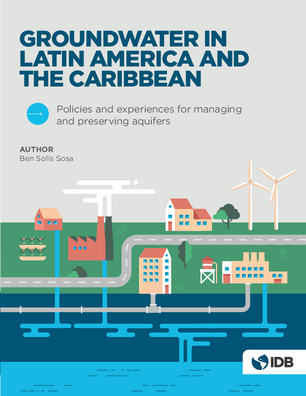Groundwater in Latin America and the Caribbean: Policies and Experiences for Managing and Preserving Aquifers
Date issued
May 2023
Subject
Water and Sanitation;
Groundwater;
Artificial Intelligence;
Economy;
Transboundary Water;
Tariff System;
Water Management;
Potable Water;
Groundwater Recharge;
Water Resources Management;
Water Resource
JEL code
H41 - Public Goods;
L95 - Gas Utilities • Pipelines • Water Utilities;
Q01 - Sustainable Development;
Q15 - Land Ownership and Tenure • Land Reform • Land Use • Irrigation • Agriculture and Environment;
Q21 - Demand and Supply • Prices;
Q25 - Water
Category
Monographs
Groundwater represents 99% of the planet's fresh water and is a natural resource that is crucial for human activities. Its extraction allows meeting the demand for several purposes such as human consumption, industrial use, and irrigation. In Latin America and the Caribbean, around 30% of extracted fresh water comes from underground sources. However, certain activities, such as industry, utilize it more intensively, with 50% of its demand being supplied by this source.
This monograph addresses the characteristics that make groundwater both a challenge and an opportunity for the region. On one hand, it contributes to economic activity and population supply, playing an important role in achieving Sustainable Development Goals, especially in rural areas. Additionally, in the context of climate change, groundwater provides a natural storage capacity that ensures the resilience of water services against extreme events, such as droughts or disruptions in supply due to increased turbidity. However, being a common pool resource, groundwater is particularly vulnerable to threats such as pollution and overexploitation. Therefore, it is necessary for countries to implement proper regulations to ensure the quantity and quality of the resource in aquifers and its availability in the future. This document explores the importance of groundwater resources in Latin America and the Caribbean, reviews management instruments (both demand and supply), examines experiences in the region, and proposes policy recommendations as a conclusion.
This monograph addresses the characteristics that make groundwater both a challenge and an opportunity for the region. On one hand, it contributes to economic activity and population supply, playing an important role in achieving Sustainable Development Goals, especially in rural areas. Additionally, in the context of climate change, groundwater provides a natural storage capacity that ensures the resilience of water services against extreme events, such as droughts or disruptions in supply due to increased turbidity. However, being a common pool resource, groundwater is particularly vulnerable to threats such as pollution and overexploitation. Therefore, it is necessary for countries to implement proper regulations to ensure the quantity and quality of the resource in aquifers and its availability in the future. This document explores the importance of groundwater resources in Latin America and the Caribbean, reviews management instruments (both demand and supply), examines experiences in the region, and proposes policy recommendations as a conclusion.
Generative AI enabled




